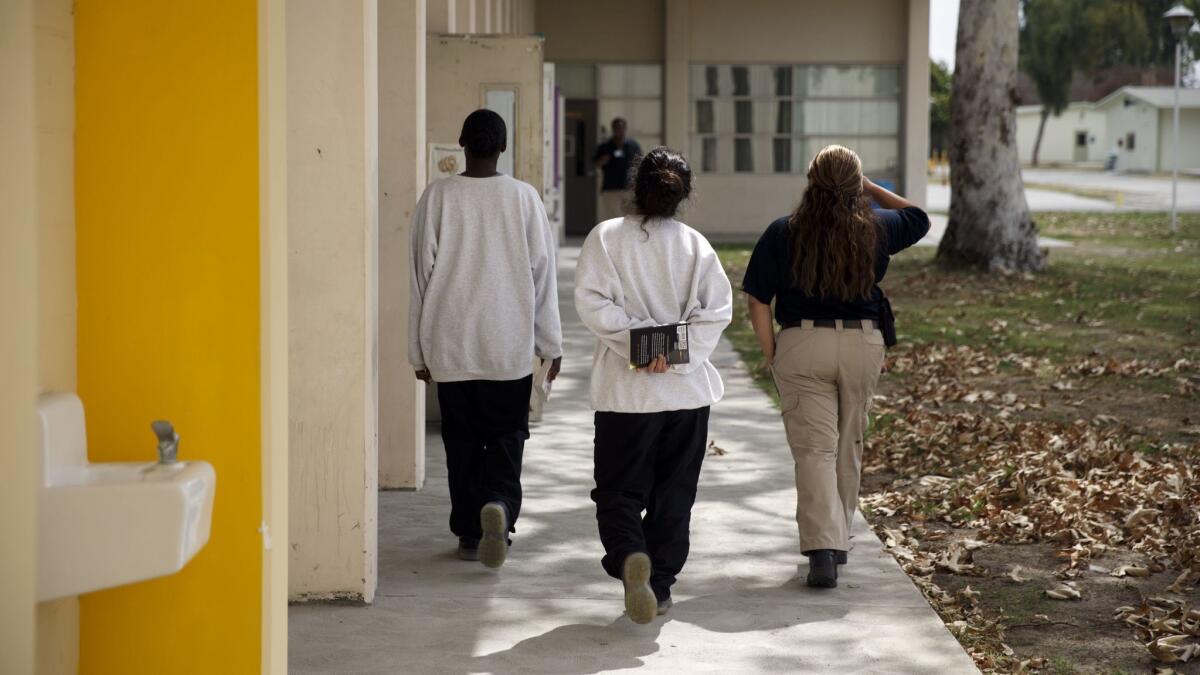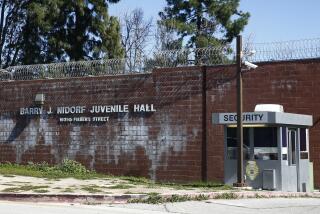Editorial: Pepper-spraying arrests reveal deep problems in L.A. County’s Probation Department

There are at least two takeaways from the criminal charges filed Friday against six Los Angeles County deputy probation officers in their pepper-spraying of girls at Los Padrinos juvenile hall in Downey last year.
The first is that pepper spraying is serious. It is a form of attack nearly as brutal as the beatings of jail inmates that led to criminal charges against sheriff’s deputies less than a decade ago. Pepper spray doesn’t break bones or rupture internal organs, but it leaves the target both incapacitated and in agony from the burning on skin, in the eyes and other sensitive tissues. The effects are even worse if the victims are not permitted to immediately relieve their pain by rinsing the spray from themselves, as is charged in the complaints.
Pepper spray can be used as an instrument of self-defense and as a tool to stop inmate-on-inmate violence — or it can be misused as a weapon by staff seeking to demonstrate their authority or react to expressions of insolence as Dist. Atty. Jackie Lacey’s charges would seem to suggest.
When employed against juveniles, pepper spray comes close to child abuse or even torture. Some other probation departments in California still have it on hand, to be deployed in case of emergency, but many other states have banned it. Earlier this year, the L.A. County Board of Supervisors wisely ordered the phase-out of pepper spray at juvenile halls and camps after hearing a shocking report from the county’s inspector general documenting an increase in its use and a failure to abide by required protocols for warning youths before spraying, and permitting them to decontaminate afterward.
When employed against juveniles, pepper spray comes close to child abuse or even torture.
The second takeaway is that there is something seriously wrong in the county’s Probation Department and the network of facilities it operates. In the halls, which house youths who have been arrested for serious offenses and are awaiting court hearings, and in the camps, where sentenced youths are supposed to receive guidance, a portion of the staff seems so unsuited or ill-equipped for their jobs that they lash out criminally. At meetings of a panel charged with recommending changes in the way the department is overseen, some deputy probation officers discuss the juveniles they are supposed to mentor as if they were dangerous animals. At a recent Board of Supervisors meeting, some officers sat in the audience and hooted approval as witnesses described juveniles in ugly racist terms.
Indiscriminate and allegedly criminal use of pepper spray signals a department culture in crisis.
Juvenile justice has changed dramatically over the last several decades, especially in Los Angeles County. There was a fashion, for a time, of turning juvenile probation facilities into boot camps dispensing military-style discipline — despite state laws that meticulously lay out the goal of the juvenile justice system as rehabilitation, not punishment. The focus has since returned to the core mission of rehabilitation. After decades of building and staffing up, probation leaders have come to see that juvenile rehabilitation can often be most successfully offered in their home communities, not in locked facilities.
The population of juvenile halls and camps has plunged, leaving only the most difficult cases — usually ones that involve trauma or mental illness and require a high level of specialized care. Not every deputy probation officer has the skills or the desire to deal with such cases.
Enter the Fray: First takes on the news of the minute »
In L.A. County, chief probation officers have swiftly come and gone, leading to inconsistent messages about the department’s mission and employee standards.
The current chief probation officer, Terri McDonald, said the department launched the investigation that resulted in the criminal charges, which shows that it takes excessive force allegations seriously.
The county has conducted or commissioned numerous studies of the Probation Department over many years. A Probation Reform and Implementation Team is in the midst of a series of hearings on juvenile probation practices, and we hold out hope that the panel can recommend changes that bring the department and its staff up to date. But it’s a tall order.
In the meantime, the use of brutal force in juvenile halls and camps should be investigated and, where appropriate, prosecuted. Excessive force cannot be tolerated, whether it is meted out by cops on the streets, by guards in the jails or — most certainly — by probation officers against juveniles.
Follow the Opinion section on Twitter @latimesopinion and Facebook
More to Read
A cure for the common opinion
Get thought-provoking perspectives with our weekly newsletter.
You may occasionally receive promotional content from the Los Angeles Times.










